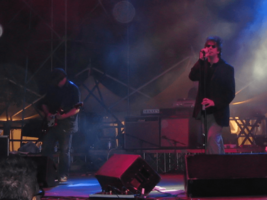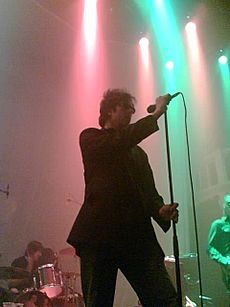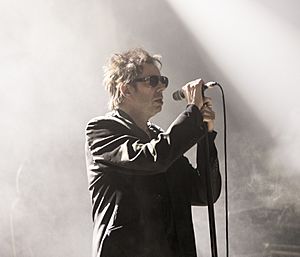- This page was last modified on 17 October 2025, at 10:18. Suggest an edit.
Echo & the Bunnymen facts for kids
|
Echo & the Bunnymen
|
|
|---|---|

Will Sergeant (left) and Ian McCulloch (right) in 2005
|
|
| Background information | |
| Origin | Liverpool, England |
| Genres |
|
| Years active | 1978–1993, 1996–present |
| Labels | Korova, Zoo, Sire, Warner Bros., Euphoric, London, Cooking Vinyl, Ocean Rain |
| Associated acts | Electrafixion |
| Members |
|
| Past members |
|
Echo & the Bunnymen is a rock band from Liverpool, England. They formed in 1978. The first members were singer Ian McCulloch, guitarist Will Sergeant, and bass player Les Pattinson. In 1980, Pete de Freitas joined as their drummer.
Their first album, Crocodiles, came out in 1980. It reached the top 20 in the UK. Their second album, Heaven Up Here (1981), also did well. The band became very popular in the UK in 1983. Their song "The Cutter" was a Top 10 hit. The album it came from, Porcupine, reached number 2.
Ocean Rain (1984) continued their success. Its main song, "The Killing Moon", was another Top 10 hit. After their self-titled album in 1987, Ian McCulloch left the band. Singer Noel Burke took his place. Sadly, in 1989, Pete de Freitas passed away in a motorcycle accident.
McCulloch and Sergeant later worked together as Electrafixion. In 1997, they reunited with Pattinson. They decided to bring back the name Echo & the Bunnymen. Les Pattinson left in 1998. Since then, McCulloch and Sergeant have continued to tour and release new music.
Contents
Band History
How it Started
Ian McCulloch started his music journey in 1977. He was part of a small band called the Crucial Three. Later, he formed Echo & the Bunnymen with guitarist Will Sergeant and bass player Les Pattinson. At first, the band used a drum machine. Many people thought the drum machine was "Echo." But the band members have said this is not true.
Will Sergeant explained the band's name in a book from 1982:
We had this mate who kept suggesting all these names like The Daz Men or Glisserol and the Fan Extractors. Echo and the Bunnymen was one of them. I thought it was just as stupid as the rest.
The band played their first show in Liverpool in November 1978. They played one long song. Their first song released was "The Pictures on My Wall" in May 1979.
The band started to get more attention. They were invited to record songs for the BBC's John Peel Show. They were still using a drum machine at this time.
Pete de Freitas Joins
By the time their first album, Crocodiles, came out in July 1980, Pete de Freitas had joined as their drummer. Pete was different from the other members. He came from a wealthy family and grew up in the south of England. But he was friendly and outgoing. This made him a good fit for the band.
Pete joined the band in September 1979. His first live show with them was in London. They opened for popular ska bands, but the audience didn't like them much. They were booed off stage after only two songs.
The song "Rescue" was the first single from Crocodiles. It reached No. 62 in the UK. The album itself was a big success. It reached No. 17 and was praised by music critics.
The album cover for Crocodiles was special. It showed the band in a mysterious forest. This was the first of four album covers that used natural settings. They showed the band from a distance. The covers were designed by Martyn Atkins and photographed by Brian Griffin.
Shine So Hard Film
In late 1980, the band went on their first big tour to promote Crocodiles. Their manager, Bill Drummond, decided to film their last concert. This film was meant to be their first music video. But it became much more than that.
The concert was held on January 17, 1981, in a beautiful glass hall in Buxton, England. The band invited 500 fans to the secret show. They even provided buses from different cities.
The film, called Shine So Hard: An Atlas Adventure, was 33 minutes long. It showed the band preparing for the show and then performing four songs. It captured the band's energy and their impressive stage lighting. The film was shown in some UK cinemas. The songs from the film were also released on an EP (a short album). This EP reached #37 in the UK charts. It was the band's first hit single in Britain.
Heaven Up Here Album
In April 1981, the band started touring again for their next album. This included their first shows in America. They played in cities like New York, Chicago, and Los Angeles. They also toured the UK and Europe. In November, they visited Australia for the first time.
Their second album, Heaven Up Here, was recorded in Wales and released in May 1981. The band enjoyed making this album. It became an even bigger success than Crocodiles. It reached No. 10 in the UK. The only single from the album, "A Promise", reached No. 49.
The album cover for Heaven Up Here continued the natural theme. It showed the band on a beach at sunset, looking out to sea. The photo was taken in South Wales. The photographer had to use fish to attract seagulls for the shot!
Porcupine and Big Success
In June 1982, the band had their first Top 20 hit with "The Back of Love" (No. 19). They played at festivals and concerts in Britain and Europe. They even played with The Drummers of Burundi at the WOMAD festival.
Most of 1982 was spent recording their third album, Porcupine. This was a difficult process. The first version of the album was rejected by their record company. They said it was "too uncommercial." So, the band had to re-record the whole album. They added strings with Indian violinist Shankar.
During this time, the band members were not getting along well. The bass player, Les Pattinson, was tired of the music business. Ian McCulloch said the mood in the band was "horrible." But despite these problems, the re-recording went well.
When Porcupine was released in early 1983, it was a huge success. The song "The Cutter" became their first Top 10 single, reaching No. 8. The album itself hit No. 2 in the charts. They were now a very popular band. Other hits followed, like "Never Stop" (No. 15) and "The Killing Moon" (No. 9).
Ocean Rain Album
In 1984, the band had a very busy year of touring. They played in Japan for the first time. Then they toured the United States, Europe, and the UK.
Before Ocean Rain was released in 1984, Ian McCulloch said it was "the greatest album ever made." The album reached No. 4 in the UK. Today, many people see it as the band's most important album. Songs like "Silver" (UK No. 30) and "Seven Seas" (UK No. 16) were also successful.
After Ocean Rain, the band took a break. They also changed managers.
Later Years and Changes
The band released the single "Bring on the Dancing Horses" (UK No. 21) in 1985. They also put out a collection of their best songs called Songs to Learn & Sing, which reached No. 6.
In late 1985, drummer Pete de Freitas left the band for a short time. The band had to find new drummers for their tours. Pete later rejoined the band. Their fifth album, Echo & the Bunnymen (1987), was recorded with Pete. It sold well in the UK (No. 4) and was their only album to have good sales in America. This was the last album recorded with the original band members.
Some of the band's songs became famous through movies. "Bring on the Dancing Horses" was in the film Pretty in Pink. They also covered The Doors' song "People Are Strange" for The Lost Boys soundtrack.
McCulloch Leaves, de Freitas Passes Away
In March 1988, Ian McCulloch announced he was leaving the band. He wanted to see his father, who was very ill. McCulloch later started his solo career.
The remaining members decided to continue the band. They found a new singer, Noel Burke. Keyboardist Jake Brockman also became a full member.
However, a tragedy happened on June 14, 1989. Pete de Freitas was killed in a motorcycle accident. He was only 27 years old.
After Pete's death, the band found a new drummer, Damon Reece. The new five-member band recorded the album Reverberation in 1990. But the album did not do well. The band was then dropped by their record company. After two more songs that didn't do well, Echo & the Bunnymen broke up in 1993.
Coming Back Together
In 1994, Ian McCulloch and Will Sergeant started working together again. They called themselves Electrafixion. In 1997, Les Pattinson rejoined them. This meant the three surviving original members were back together. They decided to use the name Echo & the Bunnymen again. They released the album Evergreen (1997), which reached the UK Top 10.
Before their next album, What Are You Going to Do with Your Life? (1999), Les Pattinson left the band. Ian McCulloch and Will Sergeant have continued as Echo & the Bunnymen. They have toured a lot and released several more albums. These include Flowers (2001), Siberia (2005), The Fountain (2009), and Meteorites (2014).
In 2002, the band received the Q Inspiration award. This award is for inspiring new musicians and music lovers.
In 2009, former keyboard player Jake Brockman passed away in a motorbike accident.
In 2010, Echo & the Bunnymen went on tour. They played their first two albums, Crocodiles and Heaven Up Here, in full. Their most recent album of new songs, Meteorites, came out in 2014. It was their first UK Top 40 album since 1999.
In 2018, they released The Stars, the Oceans & the Moon. This album had new versions of their old songs with an orchestra, plus two new songs. In September 2023, the band planned a tour to play their Ocean Rain album completely.
Band Members
Current Members
- Ian McCulloch – vocals, guitar, keyboards (1978–1988, 1996–present)
- Will Sergeant – guitars, programming (1978–1993, 1996–present)
Former Members
- Les Pattinson – bass (1978–1993, 1996–1998)
- Pete de Freitas – drums (1979–1989; passed away 1989)
- Noel Burke – vocals, guitar (1988–1993)
- Damon Reece – drums (1989–1993)
- Jake Brockman – keyboards (1989–1993; passed away 2009)
Timeline of Members

Albums
- Crocodiles (1980)
- Heaven Up Here (1981)
- Porcupine (1983)
- Ocean Rain (1984)
- Echo & the Bunnymen (1987)
- Reverberation (1990)
- Evergreen (1997)
- What Are You Going to Do with Your Life? (1999)
- Flowers (2001)
- Siberia (2005)
- The Fountain (2009)
- Meteorites (2014)
- The Stars, the Oceans & the Moon (2018)
See also
 In Spanish: Echo & the Bunnymen para niños
In Spanish: Echo & the Bunnymen para niños


